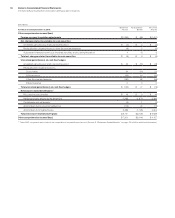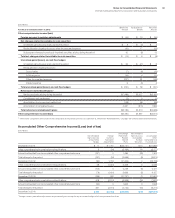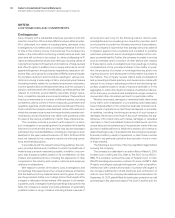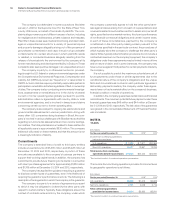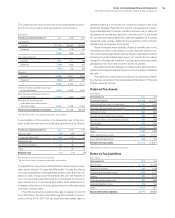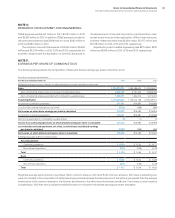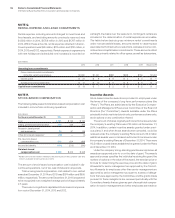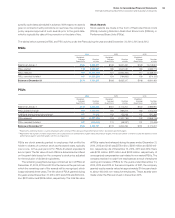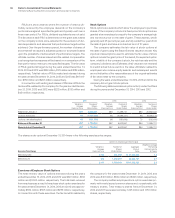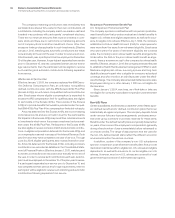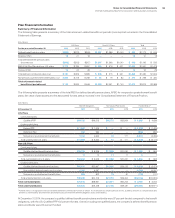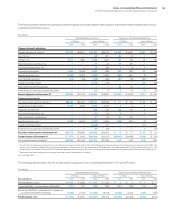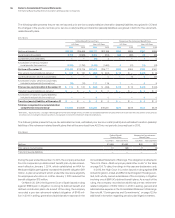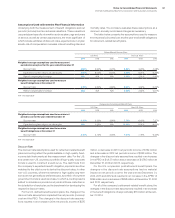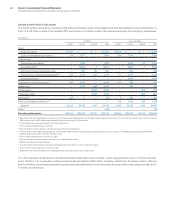IBM 2014 Annual Report Download - page 131
Download and view the complete annual report
Please find page 131 of the 2014 IBM annual report below. You can navigate through the pages in the report by either clicking on the pages listed below, or by using the keyword search tool below to find specific information within the annual report.
Notes to Consolidated Financial Statements
International Business Machines Corporation and Subsidiary Companies
130
PSUs are stock awards where the number of shares ulti-
mately received by the employee depends on the company’s
performance against specified targets and typically vest over a
three-year period. For PSUs, dividend equivalents are not paid.
The fair value of each PSU is determined on the grant date, based
on the company’s stock price, adjusted for the exclusion of divi-
dend equivalents, and assumes that performance targets will be
achieved. Over the performance period, the number of shares of
stock that will be issued is adjusted upward or downward based
upon the probability of achievement of performance targets. The
ultimate number of shares issued and the related compensation
cost recognized as expense will be based on a comparison of the
final performance metrics to the specified targets. The fair value
of PSUs granted at target during the years ended December31,
2014, 2013 and 2012 was $257 million, $170 million and $186 million,
respectively. Total fair value of PSUs vested and released during
the years ended December31, 2014, 2013 and 2012 was $161 mil-
lion, $156 million and $203 million, respectively.
In connection with vesting and release of RSUs and PSUs, the
tax benefits realized by the company for the years ended Decem-
ber31, 2014, 2013 and 2012 were $222 million, $312 million and
$454 million, respectively.
Stock Options
Stock options are awards which allow the employee to purchase
shares of the company’s stock at a fixed price. Stock options are
granted at an exercise price equal to the company’s average high
and low stock price on the date of grant. These awards, which
generally vest 25percent per year, are fully vested four years from
the date of grant and have a contractual term of 10years.
The company estimates the fair value of stock options at
the date of grant using the Black-Scholes valuation model. Key
inputs and assumptions used to estimate the fair value of stock
options include the grant price of the award, the expected option
term, volatility of the company’s stock, the risk-free rate and the
company’s dividend yield. Estimates of fair value are not intended
to predict actual future events or the value ultimately realized by
employees who receive equity awards, and subsequent events
are not indicative of the reasonableness of the original estimates
of fair value made by the company.
During the years ended December31, 2014, 2013 and 2012, the
company did not grant stock options.
The following table summarizes option activity under the Plans
during the years ended December31, 2014, 2013 and 2012.
2014 2013 2012
Weighted-
Average
Exercise Price
Number of
Shares
Under Option
Weighted-
Average
Exercise Price
Number of
Shares
Under Option
Weighted-
Average
Exercise Price
Number of
Shares
Under Option
Balance at January1 $97 5,622,951 $94 11,389,721 $90 20,662,322
Options exercised 97 (3,740,252) 90 (5,585,127)86 (9,080,170)
Options canceled/expired 95 (131,750) 86 (181,643)75 (192,431)
Balance at December 31 $97 1,750,949 $97 5,622,951 $94 11,389,721
Exercisable at December 31 $97 1,750,949 $97 5,622,951 $94 11,389,721
The shares under option at December 31, 2014 were in the following exercise price ranges:
Options Outstanding and Exercisable
Exercise Price Range
Weighted-
Average
Exercise Price
Number of
Shares
Under Option
Aggregate
Intrinsic
Value
Weighted-Average
Remaining
Contractual Life
(in Years)
$85 and under $ 83 351,690 $ 27,409,244 1.2
$86 and over 100 1,399,259 84,243,181 0.7
$ 97 1,750,949 $111,652,425 0.8
Exercises of Employee Stock Options
The total intrinsic value of options exercised during the years
ended December31, 2014, 2013 and 2012 was $323 million, $614
million and $1,005 million, respectively. The total cash received
from employees as a result of employee stock option exercises for
the years ended December31, 2014, 2013 and 2012 was approxi-
mately $364 million, $505 million and $785 million, respectively.
In connection with these exercises, the tax benefits realized by
the company for the years ended December31, 2014, 2013 and
2012 were $107 million, $199 million and $341 million, respectively.
The company settles employee stock option exercises pri-
marily with newly issued common shares and, occasionally, with
treasury shares. Total treasury shares held at December31,
2014 and 2013 were approximately 1,225 million and 1,153 million
shares, respectively.


